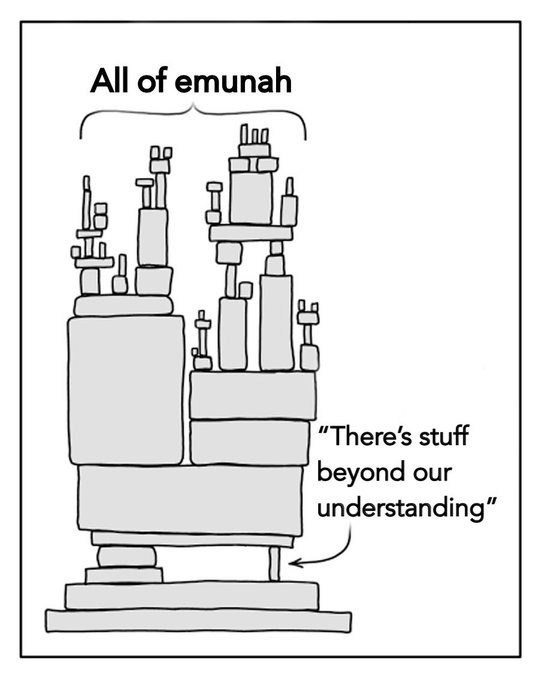Fake Intellectual Humility
The Fourteenth Principle of Faith
Try to imagine a virus which is roughly as contagious as the original Wuhan strain of Covid-19, but with a death rate of ~30 percent instead of ~1 percent. Imagine how terrifying that would be.
Such a virus did exist not long ago. The smallpox virus killed an estimated 300-500 million people during the twentieth century, and the survivors of the disease were often left permanently scarred and blinded. The smallpox virus did not discriminate against people based on their religious or moral status. It didn’t matter if you were Christian or Jewish or Muslim or atheistic, Orthodox or Reform, tzadik or rasha. As usual, none of those things could predict who would be killed.
It was thanks to the smallpox vaccine, which conferred lifelong immunity, that this menace, this ancient foe, this great tormenter of mankind, was finally defeated. In 1980, the World Health Organization announced: “The world and all its peoples have won freedom from smallpox.” This was one of the greatest achievements in all of human history. Governments have since ceased vaccinating their populations against smallpox, because it no longer exists in the wild (we are very fortunate that the anti-vax movement didn’t exist back then). Davening never protected anyone from smallpox. Torah never protected anyone from smallpox. (Torah never protected anyone from anything). It was thanks to modern science that the smallpox virus was vanquished forever (well, maybe not forever).
Why didn’t God reveal the secret of artificial immunization in the Torah so that we could protect ourselves from smallpox? Or better yet, why didn’t the Intelligent Designer simply refrain from Designing such a monstrosity of pure demonic evil in the first place? The world makes more sense when you interpret things like smallpox as the consequences of living in an cold and uncaring universe, rather than as the designs of a warm and loving deity. (In fact, this interpretation explains everything perfectly. It works fine on its own. No other explanations are needed. Any other explanation adds additional complexity without explaining anything, violating Occam’s razor1)
If I did believe in a god, it would be a neutral, indifferent god who doesn’t share our human conceptions of good and evil. Or perhaps a god who is both good and evil but not exclusively either. Or perhaps there would be several gods, who fight with each other for influence in the world. Those are the sorts of gods one would expect to find based on the evidence of the senses. One would not expect to find an omnipotent, omniscient, omnibenevolent god (nor would one expect to find an omnipotent, omniscient, omnimalevolent god. There is some good in the world too, after all).
Some of my religious readers may object that the problem of evil isn’t a new problem. This isn’t a chiddush, better minds than you have pondered this question and they still believed in God, great thinkers have contended with this for thousands of years, there are things are beyond our understanding, etc. Even Moshe Rabbeinu didn’t understand it! And they’re right. All of that is true (except the part about Moshe Rabbeinu, who probably never existed). But the problem of evil is not really what this post is about. The purpose of this post is to respond to that objection. I don’t think that “better minds than you have pondered this question” or “these things are beyond our understanding” should cause anyone to stop thinking about the question.
There are two closely related arguments being made here:
There are certain things which are just beyond our understanding and it’s presumptuous to think that our puny minds are capable of understanding all of God’s ways. As it is written in Isaiah 55:8-9: “For my thoughts are not your thoughts, and my ways are not your ways, says Hashem. For as the heavens are higher than the earth, so are my ways higher than your ways and my thoughts higher than your thoughts.”
There are lots of people much smarter and more knowledgeable than you (e.g. great rabbis) who have these same questions but they stay religious.
For example, when I was in high school, my rebbi told us that if we ever have questions in emunah, we should ask ourselves: “Do you think you’re the first person to think of this question? Do you think Rav Chaim Kanievsky and the Chazon Ish never thought of this question? They never wavered in their faith. Do you think you’re smarter than Rav Chaim and the Chazon Ish?”
When I expressed doubts in the religion to my sister, she told me that I should “ask a rabbi” (as if I haven’t done that already). And my father said that he’s “not smart enough to debate” me, implying that he doesn’t know why he’s right, but he just knows that he is, and that someone smarter than him will have the answers.
One of my favorite writers when I was religious was the rabbi-physicist Aryeh Kaplan, a brilliant talmid chacham. You need to be really really smart to be a physicist, so if someone as smart as Rabbi Kaplan vouched for Judaism, that does give it a certain credibility.
In the comments section of one of R’ Slifkin’s old posts The Noah's Ark Challenge, Michael Sedley writes:
[…] If/when I have time, I'll try to look at some of the other sources that you posted, however I think that to have challenging questions that I cannot answer today (and may never be able to answer) is not a challenge to my Emuna - rather it reminds me that as a Human being there are limits to what I can understand, and there will always be challenges and questions to grapple with. […]
To which “Hp” (who I’ve deduced to be Rabbeinu Happygoluckypersonage שליט"א) replied:
I also feel like you, even though I'm much more fundamentalists and anti-rationalist. I just can't dismiss the actual evidence that I understand from fossils, geological formations, tree rings, ice cores, carbon dating, etc. The fundamentalist answers aren't very good. But neither are the allegorical or "dramatic" readings of Creation and the Flood, at least to my mind. So I have to leave it as an unanswered question, like I commonly do with particularly frustrating questions when learning Gemara2.
I can’t remember which one, but in one of Happy’s Irrationalist Modoxism posts, he wrote that there are certain things that are just beyond our understanding and all doubts will be answered eventually in olam haba. (He can feel free to correct me if I’ve misquoted him).
This approach kept me religious for a long time. I don’t think it’s an exaggeration to say that it was the foundation of my faith. I am confident that this was the main reason why I became an atheist at 22 instead of at 13. I remember when I first started having doubts at around the age of 13, I reassured myself by recalling a famous Socrates quote: “The only thing you know is that you know nothing.” All of my doubts are due to my ignorance, I told myself. There are people much older and wiser than me who are still religious, so there must be answers to all these questions. And even if nobody knows the answers, that just means God’s ways are beyond human understanding. This is so fundamental that I think it’s a plausible candidate for the 14th Principle of Faith. “I believe with absolute faith that there are answers to every possible question one could ask about the previous 13 Principles, even if no human alive currently knows what those answers are.”
What’s the problem with this approach? Why did it stop working for me?
Well, I realized a few things.
First and foremost, THIS APPROACH BEGS THE QUESTION!!!! It just presupposes that Judaism is true! You aren’t actually pleading ignorance, you’re implicitly saying that you know with absolute certainty that Judaism is true and nothing will ever change your mind. That’s not humility, it’s extreme, extreme arrogance. It is intellectual arrogance masked as humility, hence the title of this post. REAL intellectual humility says “All of my beliefs could be wrong and I’m always open to changing my mind in light of new evidence.” FAKE intellectual humility says “It’s impossible for my belief to be wrong. If my belief appears to be wrong, that’s only because of my ignorance. Every argument against my belief MUST have an answer, even if I don’t know what the answer is, because I just know that my belief is true.” Instead of saying “There’s things beyond our understanding”, you should really just say “I have absolute, iron-clad, bulletproof faith that Judaism is true, end of story”. But why does Judaism deserve such extreme benefit of the doubt? What did Judaism ever do to earn so much trust? If you were born into a Christian or Muslim family, would you give Christianity or Islam the same extreme benefit of the doubt?
Secondly, I realized that there’s lots and lots of super smart people who don’t believe in Orthodox Judaism. There were plenty of great minds who pondered the problem of evil and came to conclude that there is no God! If you dismiss the problem of evil (or any other emunah question) by saying “minds greater than yours have pondered this question and still believed in God”, you’re forgetting about all the great minds who pondered the question and were nonbelievers. In fact, most super smart people don’t believe in Orthodox Judaism. They either belong to another religion or no religion. St. Thomas Aquinas was obviously a pretty smart guy, and he obviously didn’t believe in Orthodox Judaism. The vast majority of physicists don’t believe in a personal god who gives us commandments and listens to our prayers; Rabbi Kaplan was an extreme outlier in this regard. So “there’s smart people who agree with me” is not a sufficient reason to conclude that your belief is true. Rabbis do not have a monopoly on intelligence.
You may object that raw intelligence isn’t the only factor — one must also consider knowledge and expertise. Rabbis are experts on Judaism so they’re more qualified to judge whether it’s true. But I’m not convinced that knowledge of Judaism makes you more qualified to judge the truth of the religion, just like someone who memorizes the entire Quran and all the hadiths is not necessarily in a better position to judge whether Islam is true. You could even have total mastery of Jewish religious literature and still be mostly ignorant of the reasons why one might be skeptical of Judaism. For example, Rav Chaim’s and the Chazon Ish’s mental image of an “apikores” was probably very cartoonish, like someone who really knows The Truth deep down but denies it because he’s a baal taiva. Or someone who doesn’t realize the folly of trying to change the Torah (Don’t those fools know that Reform is just like the Korach people, and Yeravam ben Nevat, and the Tzedukim?!). Or someone who knows that the Written Torah is legit but “has questions on” the Oral Torah. Or someone who simply hasn’t encountered Rabbi Akiva’s argument that garments do not simply create themselves. Someone who doesn’t know that ink randomly spilled on paper does not accidentally arrange itself into a beautiful blatt gemara. Someone who thinks that the Exodus miracles were a series of extremely fortuitous natural occurrences. Or that Moses and Aaron were master magicians. Or that a monkey gave birth to a human. Or someone who simply hasn’t pondered the question of “if people evolved from monkeys then WHY ARE THERE STILL MONKEYS⁉️⁉️⁉️⁉️”, and as soon as you ask them this question, their entire atheist worldview is shattered into a million pieces and they run home crying to mama like a little baby. And so on. I’m not saying that all religious people are unfamiliar with anti-religious arguments (Rabbi Slifkin is one example of a religious person who could easily pass the ideological Turing test). My point is that Torah knowledge is, at best, only a tiny tiny tiny tiny tiny fraction of what you need to judge whether Judaism is true.
Thirdly, I realized that there’s lots of super smart people who believe silly nonsense. For example, Elon Musk is convinced that there is an epidemic of cat-eating Haitians in Springfield, Ohio. Famed mathematics prodigy and domestic terrorist Ted Kaczynski (also known as the Unabomber) believed that, in his own words, “The Industrial Revolution and its consequences have been a disaster for the human race” (in fact, most of the human race would immediately die if we lost all of our modern technology). Alan Turing, the father of computer science, believed in fortune-telling. John von Neumann (one of the smartest men who ever lived. Way smarter than Einstein. Seriously, look him up) converted to Catholicism on his deathbed because of Pascal’s wager. And I would be shocked if Osama bin Laden scored less than 130 on an IQ test. So while smart people are more likely to be correct, other things being equal, merely being smart is no guarantee that your opinions will be correct, or even reasonable. Intelligence increases the complexity of the ideas that you’re capable of holding in your head, which can include some very clever rationalizations for very silly beliefs. Remember, as I wrote in my first-ever post, motivated reasoning is extremely powerful. The more intelligent you are, the more powerful it is. It requires a very high degree of self-awareness and introspection to avoid the pitfalls of motivated reasoning. The vast majority of people don’t even realize that they’re doing it when they’re doing it (because a motivated reasoner will be motivated to reason that they’re not a motivated reasoner)
The concept of “better minds have pondered this question” and “There are things beyond our understanding” is a psychological trick that is designed to get you to STOP THINKING. And evidently, it works. It is a very old trick, dating at least to the times of Chazal, who expressed it in the form of “Not even Moshe Rabbeinu could understand tzadik v’lo ra!”. It makes sense that they would choose Moses to say this about — who better? Moses was supposedly the greatest prophet who ever lived, who spoke with God as a man speaks with his friend, so if even he couldn’t understand it, then what gives us the right to expect to understand it ourselves?! This approach really, really does the trick for a lot of people.
Don’t fall for the trick. Never stop thinking. Never stop questioning. Think about whatever hurts the most.
In one of Happy’s IM posts (I forget which one) he rejects R. Slifkin’s approach to some theological problem because, he says, it “creates more questions than it answers.” I wish he would realize that this critique applies even more to Judaism itself!
It’s funny how he tries to pigeonhole the more dangerous “outside” questions which could undermine the foundations of his entire belief system into a more familiar category of “inside” questions that are asked within the framework and parameters of the belief system. It comes off as rather desperate attempt to minimize the psychological threat posed by the former type of questions.





'Famed mathematics prodigy and domestic terrorist Ted Kaczynski (also known as the Unabomber) believed that, in his own words, “The Industrial Revolution and its consequences have been a disaster for the human race” (in fact, most of the human race would immediately die if we lost all of our modern technology).'
Obviously, the Unabomber knew this. In the vast majority of species, 50% or more die before adulthood. If we took gazelles and cured gazelle child mortality, and lengthened gazelle life-span, but put them in a physical environment they were radically unsuited to temperamentally that made them chronically miserable, this would obviously be a disaster for the gazelle race.
Whether the Unabomber was wrong really comes down to whether he is right about human life in modern society being undignified. For most unabomber-lite ideologues, it's sufficient to say 'if you don't like it, turn off your computer and go live in the woods', but he did go live in the woods, so that argument doesn't work. The real argument against him is that he was a massive psychological deviant, specifically he liked to dress up in women's clothes and masturbate while fantasizing about being castrated. So, there is a valid reason to dismiss the views of some intelligent people, namely that they are nutsos.
The Unabomber, however, made some very valid criticisms of technological society, which thoughtful people should, and in fact do, take on board. For example, his criticisms of the automobile are mainstream in high IQ progressive circles, and many European city centers have been pedestrianized, with more to come בע"ה.
Welcome back